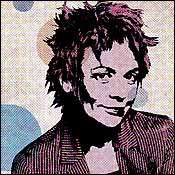
When NASA called Laurie Anderson and asked her to be the agency’s first artist-in-residence, she quite naturally suspected a crank on the line and hung up. But yes, NASA actually does have an arts program, which includes an archive containing some 800 works by 250 artists and musicians, including Robert Rauschenberg, Annie Leibovitz, Norman Rockwell, Terry Riley, and the Kronos Quartet. At $50,000, the annual funding is just a drop in NASA’s $16 billion budget, and Anderson only got a modest $20,000 for her two-year tenure, but wow—maybe Christo is already on his way to Mars.
Anderson’s NASA experience produced a 90-minute monologue called The End of the Moon, which just finished a two-week run at the Brooklyn Academy of Music’s Harvey Theater. In part a humbled response to the formidable scientific know-how of her new patron, Anderson’s latest piece of performance art relies less on her usual elaborate electronic paraphernalia, which here is comparably low-key and low-tech. Gone is the famous talking stick, an encyclopedic sound source when touched, waved, or stroked. Gone, too, are the electronic pitch synthesizers that altered her mellow mezzo-soprano and gave it a five-octave range. And the stacks of computers that filled four semi-trailers on their way from one gig to another have been replaced by a simple laptop and a modest amplification system.
All this seems just about right for what is essentially a hushed meditation on the imponderables that inhabit space, both near and far. Anderson, an elfin woman, is by now so comfortable with her post-punk Virginia Woolf image, wired sound apparatus, and role as a counterculture sibyl that she makes even the most alarming pronouncements somehow seem whimsical and friendly. The darkly shrouded stage setting also contributes to the otherworldly, soothingly ritualistic tone of the piece: a floating field of votive candles, a small screened projection of a moon crater, an easy chair to snuggle in while spinning a yarn, clouds of dry-ice mist artfully lit from behind and idly drifting upward. In the midst of it all Anderson tells her tales as bemused understatements, a tone she seems to have modeled after the late composer John Cage, whose laid-back, he-said-she-said stage delivery conveyed much the same sort of wry humor. The stand-up-comic format gets even giddier when Anderson segues into a soulful tune on her electric viola, vaguely recalling how George Burns used his ubiquitous cigar as an expressive prop when words failed him. Running underneath it all is that comforting carpet of electronic sounds, manipulated by Anderson on her laptop to produce gentle waves of interlocking sonic commentary.
Anderson’s topics are typically wide-ranging and nothing if not up-to-date: NASA’s application of nanotechnology; the nesting habits of gay penguins; Thomas Pynchon’s stipulation that any composer who wants to make an opera out of his novels must score them for solo banjo; the horrific explosion of the space shuttle Columbia; the elusive meaning of a favorite haiku (“Spring, fall, a coughing / fit overcomes / the puppeteer”); how the sight of two hawks descending on her terrified dog Lolabelle suggested 9/11; how any war on terror is going to be endless—“this war will never be over; it will just keep moving from place to place.”
This absorbing monologue also moves seamlessly from one surprising place to another. Its inexorable flow is surely due in part to the fact that Anderson, after 25 years on the job, has carefully refined her performance-art technique, which seems more direct than ever in its new stripped-down format. Beyond that, she is a genuine musician, as one hears in the lilt and rhythmic timing of her narratives, in the subtle coloristic overlays of the electronic accompaniments, and in the lyrical simplicity of her viola solos, which take over when words can no longer carry the burden. Apparently NASA has no plans to continue its artist-in-residence program—a pity, since poets may sometimes be better equipped to explore the unknown than scientists.
The End of the Moon
Laurie Anderson.
Harvey Theater at Brooklyn Academy of Music.